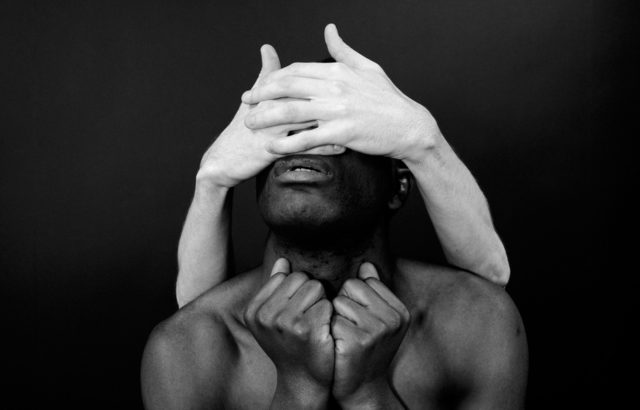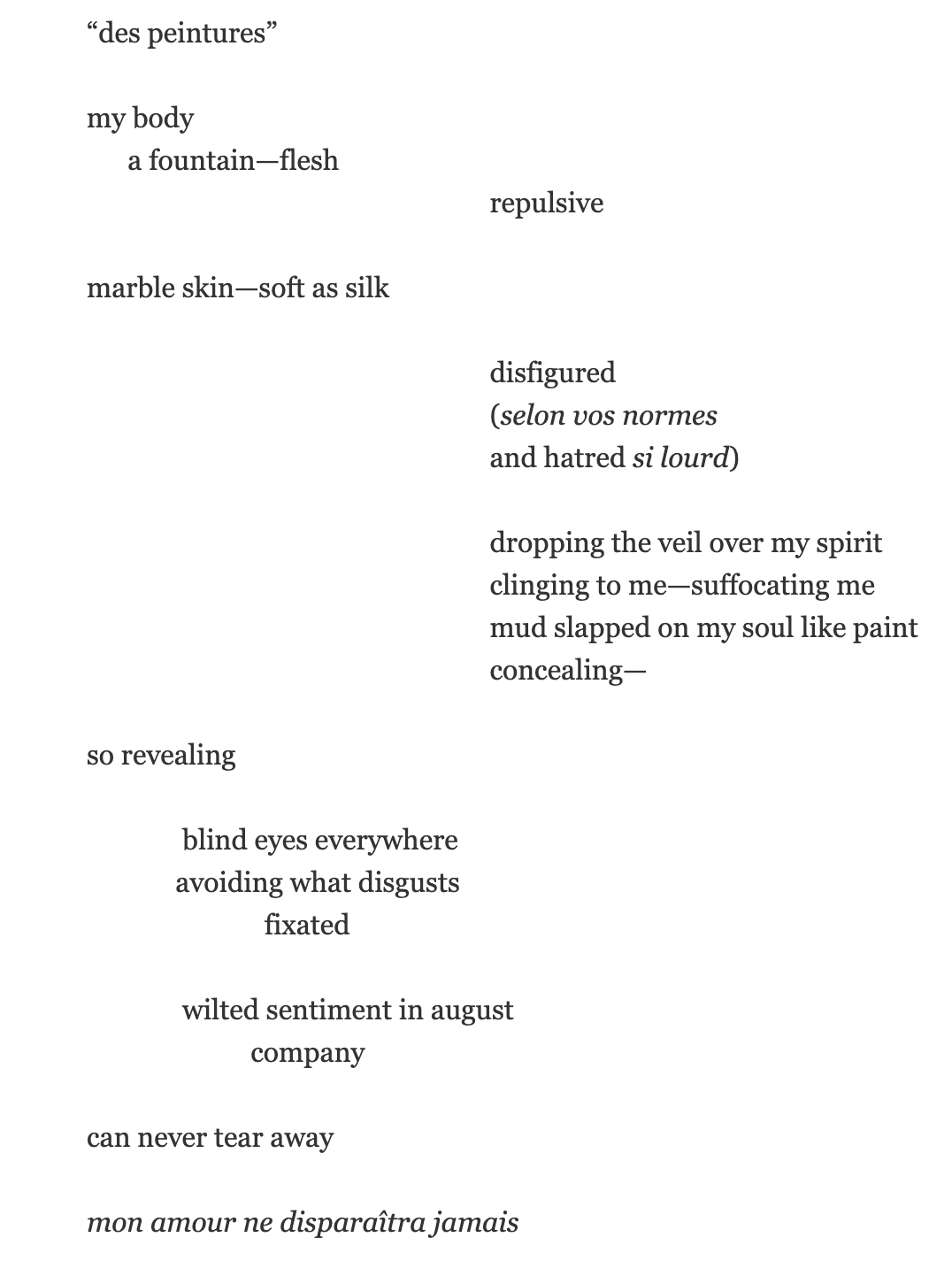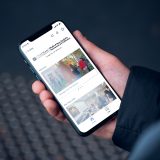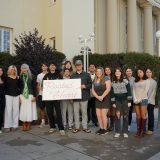
Rotimi Fani-Kayode The Art of Being an Outsider
June 7, 2021
In honor of LGBTQIA+ Pride Month, the Escalette Permanent Collection of Art would like to feature the work and life of Rotimi Fani-Kayode, a Nigerian-British photographer who used his art to capture the black queer experience, to reject homophobia, and to fight for equal political representation during the AIDS crisis.

Rotimi Fani-Kayode, Untitled, gelatin silver print, 1985/2018. Purchased with funds from the Escalette Endowment.
Fani-Kayode was born in 1955 in Lagos, Nigeria, where his father was a politician and chieftain of Ife, the ancestral Yoruba capital. At age 11, Kayode and his family fled to Brighton, England to escape the Nigerian Civil War. He is also the founder of Autograph a nonprofit organization that helps black and minority photographers build their careers. Fani-Kayode created much of his work during the height of the AIDS crisis in response to the homophobia he witnessed in England under Margaret Thatcher and in his home country of Nigeria. Using the black body as his primary subject, Fani-Kayode explored themes of black queerness and cultural identity in a political call to action. His photographs combine African and European iconography to contest the marginal status of Yoruba culture and explore the position of the black body in Western society. In some images, Fani-Kayode incorporates elements of Yoruba spirituality into ironic signifiers of African “otherness” in a way that rejects the Primitivist themes of European modernism. Other images employ eroticism and moments of intimacy or communion to present queer sexuality as an act of healing and survival.

Rotimi Fani-Kayode, In Gods We Trust, gelatin silver print, c. 1980s/2018. Purchased with funds from the Escalette Endowment.
The two works in the Escalette Permanent Collection of Art, Untitled and In Gods We Trust, are part of a series of works Rotimi Fani-Kayode created during the 1980s. These works offer an intimate encounter with his subjects, primarily black men, whose postures and interactions play with the hidden and the visible. Fani-Kayode’s works are often sexually explicit – or, more specifically, homosexually explicit – in order to challenge the queer black man’s exclusion from representation. He states: “I make my pictures homosexual on purpose. Black men from the Third World have not previously revealed either to their own peoples or to the West a certain shocking fact: they can desire each other.” In contrast to the fetishizing representation of the black body in the West or “victim” images in the media, Fani-Kayode believed that it was the time for “us to re-appropriate such images and transform them ritualistically into images of our own creation.”
“On three counts I am an outsider: in matters of sexuality, in terms of geographical and cultural dislocation; and in the sense of not having become the sort of respectably married professional my parents might have hoped for. Such a position gives me the feeling of having very little to lose. It produces a sense of freedom from the hegemony of convention… It opens up areas of creative enquiry which might otherwise have remained forbidden. At the same time, traces of the former values remain, making it possible to take new readings on to them from an unusual vantage point. The results are bound to be disorientating.”
Untitled and In Gods We Trust are currently on display on the first floor of Roosevelt Hall as part of the exhibition Begin/Again: Marking Black Memories until January 2022. You can also visit the exhibition virtually here.
Student Responses to Fani-Kayode’s Work:
Bryce Kauffman, Student, HON 338: ThanaTourism
“Out of the pieces shown in this virtual exhibit, those by Rotimi Fani-Kayode strike a particular chord with me as a bisexual person and pull the heartstrings of my empathy tied to my queer identity. The gay community as I have experienced still shakes with the echos of the Aids crisis’s traumatic stress which the community bares. An aspect of this pain spoke to me in the tensed feet of the model in the work “Untitled” poised as if to run. The gay community was left out in the wild to die as the HIV virus tore through communities. I would hope that some people look at this and feel guilt, I do in recognition of my privilege to not have to confront race in my daily life and pass for straight to the people close to me to avoid making some of my close family members uncomfortable. To be gay or black in society requires that you be on your toes, prepared for the lashings of the ruling socioeconomic racial group. The hand resting over the tensed clavicle, soothing the pain of existence.”
Trisha Gautam, Student, HON 338: ThanaTourism
“Rotimi Fani-Kayode’s story impressed upon me a vision of a life of constant rejection. Forced to leave his own homeland and entering one that did not accept who he is, Fani-Kayode remained an outsider. Despite his hardships, Fani-Kayode was courageous enough to raise his voice and relate his own experiences through his photography. He is a pioneer of the normalization of queer black people, who often struggle with extremely homophobic home lives and are unaccepted by the world outside their homes because of the color of their skin…. What struck me about Fani-Kayode’s work is the simultaneous honesty and ambiguity of it. His overall message is starkly apparent, yet the nuances of the story he is trying to convey remain ambiguous and open to interpretation.”
Ellie Nguyen, Student, ENG 472: Film, Gender, and Sexuality
“Observing the works of Rotimi Fani-Kayode left a very strong impact on me. Photography and its ability to translate different emotions and reflect on different times’ social climate is something I find remarkable and inspiring. In Rotimi Fani-Kayode’s piece titled “In Gods We Trust” we see a monotoned photo of a black queer man, his face towards the sky while a pair of white arms, much in contrast with his skin tone and the dark backdrop, are covering his vision. I found the piece extremely captivating in the many unique ways the viewers could interpret the image. It is ambiguous in form yet it could be read in various ways. For me, I related the piece to the black, queer experience that is very much underrepresented in mainstream media. Taking into account the medium that Rotimi Fani-Kayode worked with, I read it as the dominating white narrative casting a barrier to those belong to LGBTQA+ people of color. His hands are bound and fisted, as if he is tied down by this pressure of societal discrimination. But simultaneously, the hands gave me a sense of hopefulness and yearning while he faces up blindly into the unknown future. I thought it was a powerful piece, as well as “Untitled.” The man is seen naked in front of the camera, in front of the audience yet he is mostly concealed in shadow, and his eyes are also covered. The audience is can see everything yet they don’t know anything about him and his experience.
“des peintures” by Vesper North, MFA Creative Writing & MA English Literature
Read more visitor reflections and submit your own thoughts here!
—
We invite you to explore all the works in the Escalette Collection by visiting our eMuseum.
Wilkinson College of Arts, Humanities, and Social Sciences is the proud home of the Phyllis and Ross Escalette Permanent Collection of Art. The Escalette Collection exists to inspire critical thinking, foster interdisciplinary discovery, and strengthen bonds with the community. Beyond its role in curating art in public spaces, the Escalette is a learning laboratory that offers diverse opportunities for student and engagement and research, and involvement with the wider community. The collection is free and open to the public to view.


